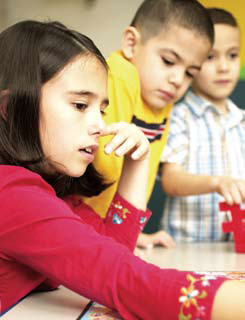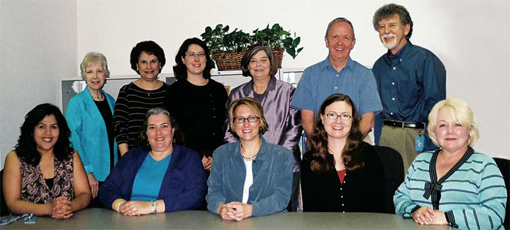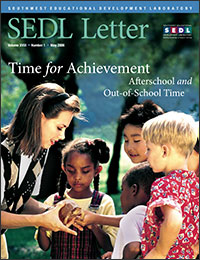National Partnership Promotes Promising Practices - Staff Training for Quality Afterschool Programs
Learning doesn't have to stop as soon as the dismissal bell rings at the end of the school day. Across the country, an estimated 6.5 million students are working on their math and reading skills and participating in enrichment programs after school. The National Partnership for Quality Afterschool Learning works to ensure best practices for afterschool learning are used nationwide. The Partnership has identified afterschool programs with promising practices in literacy, mathematics, science, technology, and the arts. It has developed an array of resources that reflect promising and research-based practices, including the online Afterschool Training Toolkit. The National Partnership also offers training to sites that need additional help.
Headquartered at the Southwest Educational Development Laboratory in Austin, Texas, the National Partnership draws on the expertise of its seven partner organizations and 13 steering committee members, who work for an array of academic and nonprofit organizations. The National Partnership comprises the following partner organizations:
- Southwest Educational Development Laboratory (SEDL), primary contractor
- National Center for Research on Evaluation, Standards, and Student Testing (CRESST) at UCLA
- Mid-continent Research for Education and Learning (McREL)
- Northwest Regional Educational Laboratory (NWREL)
- SERVE Center at the University of North Carolina at Greensboro
- WGBH Educational Foundation
- U.S. Department of Education (USDE), Office of Elementary and Secondary Education
The National Partnership is now in its third year. SEDL program manager Catherine Jordan, director of the National Partnership, is proud of the National Partnership's accomplishments.
"We have forged a working partnership with a disparate group of organizations and conducted research that is yielding important indicators for high-quality academic afterschool programs in six content areas. We have developed an online toolkit that is enabling afterschool programs to access substantive help in building their capacity to develop high-quality academic programs," Jordan says. "We've also cosponsored eight regional annual conferences, each with attendance ranging from 200 to 500, and have cosponsored the Summer Institute with the USDE, with an attendance of about 2,000 each summer. And we've done it all on budget and in the original time frame we proposed."
Promising Practices Sites
The National Partnership's initial goal was to identify sites that used promising practices in each of these areas: mathematics, literacy, science, the arts, homework and tutoring, and technology. Jordan says, "Our whole purpose was to identify what practices successful sites were using that might underlie increases in academic achievement and then develop tools and training to help others become just as successful."
The process to identify sites has been rigorous (see "Preliminary Findings,"). To begin, CRESST examined all of the annual performance data from the more than 1,600 21st Century Community Learning Program afterschool sites to answer two questions: 1) Which programs see student achievement gains? and 2) Which of these have been in existence for 3 or more years?
After identifying programs that met these criteria, CRESST researchers then asked the question: Which programs have actually achieved their program goals and have some evidence (i.e., data) to show they have met their goals? CRESST staff then conducted phone interviews with project directors from those sites that showed evidence. From the phone conversation, the researchers further narrowed down the sites that were potential promising practices sites for mathematics, literacy, the arts, homework and tutoring, or technology, and site visits began.
SEDL program associate and National Partnership product development coordinator Deborah Donnelly says, "We wanted to identify schools that not only looked good on paper but were talking the talk and walking the walk."
Jordan reports that based on the data collected, the observations, the CRESST data analysis, and the research literature reviews, she feels confident about the promising practices. "All of the promising practices we've identified so far in each subject area have been used in more than one site," she says.
Developing Program Resources and Training
Jordan notes that one of the primary aims of the National Partnership is to develop resources and training that will help afterschool sites increase student achievement, just as the promising practices sites have. "The whole purpose is to identify practices that successful programs have been using, then develop tools and training to help others," she says. The resources and training go hand in hand. Not only does the Afterschool Training Toolkit serve as the cornerstone of the National Partnership resources, but it is one piece of the organization's training. The promising practices are being used to create content for the online toolkit in each of the subject areas (see sidebar). Searchable curriculum databases are also being developed and will include reviews of high-quality curriculum in literacy, mathematics, and science.
Under its contract, the National Partnership coordinates the annual Summer Institute with the USDE and the Mott Foundation. The National Partnership is also responsible for conducting or cosponsoring eight regional conferences. "By reinforcing consistent messages and providing similar training across the country, we are trying to increase the quality and consistency of afterschool programs nationwide," says Jordan. "We not only want to spread the word about research-based practices, but we're also trying to take that knowledge into the hands of afterschool staff in order to increase student achievement. The training component of our work is so important because many afterschool staff members are not trained teachers. We want to build the capacity of afterschool staff so they can make a difference in student achievement."
Program associate Jerry Elder, who plans most of the National Partnership's large training sessions, says, "In the past, we spent a lot of time discussing program sustainability. More and more the focus is on program quality. We're on the forefront because we are creating resources for academic enrichment, which is a major part of any quality afterschool program."
Donnelly notes that the National Partnership has been helping program directors think about capacity building as a job-embedded staff development process. "All of them are having informal staff meetings," she reports. "We're encouraging them to capitalize on these informal meetings and incorporate some staff development." Elder adds, "Most of our professional development these days involves how to use the toolkit as a professional development tool."
The National Partnership staff has been promoting the toolkit as a resource to be used whenever there is a bit of free time at meetings. They have identified training that can take place in small blocks of time. They also have encouraged afterschool staff to use example activities in the toolkit to evaluate what they are currently doing. As an example, Donnelly uses the "Read Aloud" section of the toolkit's literacy component. The program director could ask afterschool staff what they think constitutes a "Read Aloud" activity; then the staff views the video. Afterward the director can pose questions such as, "How is it different from what you are doing?" and "What do you need to change what you are doing?" Then at the next meeting, staff members can share what they have learned or thought about.
Staff members' sharing is an important part of capacity building, says Donnelly. "They are all sharing expertise—essentially becoming consultants to each other," she explains.
Afterschool Toolkit Features Promising Practices, Student Engagement
As soon as you hear squeals of delight from students after their teacher calls out a math problem, you know this isn't an ordinary math class. The students are playing a competitive game called "Bacon and Egg" in their afterschool program at an elementary school in Houston, Texas. For these students, learning doesn't end as soon as class is dismissed—and that is part of the philosophy behind the Afterschool Training Toolkit created by the National Partnership for Quality Afterschool Learning.
The Afterschool Training Toolkit currently features components in mathematics and literacy. Additional content in the arts, science, technology, and homework help are also being developed. The mathematics content was created by staff at the Southwest Educational Development Laboratory (SEDL), Mid-continent Research for Education and Learning (McREL), and the WGBH Educational Foundation—three of the partners in the National Partnership. The literacy content was developed by the Northwest Regional Educational Laboratory (NWREL) and WGBH.
Centered around promising practices in afterschool instruction, this online staff development resource shows practitioners how to create engaging activities—like the "Bacon and Egg" game—that target specific academic standards. Most practices feature one or more videos shot at afterschool program sites identified as having had a positive impact on student achievement. Each also includes technology tips, sample lesson plans, and links to related resources.

An example of the many resources found within the toolkit is a 54-page literature review, which was prepared by NWREL. Eve McDermott, a senior program director at NWREL and one of the developers of the literacy content, explains that the literature review gives staff a deeper understanding of the principles that guided the selection of literacy practices in the toolkit. "I think it helps staff see how they can make subtle changes in their practice to have greater impact on the academic success of their children," she says. "Most importantly, it provides staff with a common language to be able to talk to the school day staff about the progress and needs of the students they share."
In fact, that is the goal of the entire toolkit, according to National Partnership director Catherine Jordan. She explains that because of No Child Left Behind, afterschool programs are being asked to improve student achievement. "The toolkit provides tools and training for many afterschool staff who are not well trained to provide enriched academic content. We want to provide them with the tools and training to use the promising practices that were successfully used in other sites and help them improve student success."
Research: Key to Improving Afterschool Programs
Another element of the National Partnership contract includes conducting research, especially "gold-standard" research, that will add to the growing base of research related to afterschool programming. To this end, SEDL and the National Partnership are initiating a randomized control study to determine the effectiveness of select afterschool programs on student outcomes. Results of the identification of promising practices sites and SEDL's participation in a recently released study of characteristics of high-performing afterschool programs (see article on page 24) are other research-related contributions of the National Partnership.
"All of this research will play a role in future afterschool programming," says Jordan. "We want to identify for certain what types of programs and practices can make the biggest difference in our children's academic success and develop future resources, training, and programs around those strategies."
 SEDL’s National Partnership for Quality Afterschool Learning staff get together. Front row: Maria Rodriguez, Zena Rudo, Laura Shankland, Lacy Wood, and Deborah Donnelly. Back row: Marilyn Heath, Artie Stockton, Darlene Murray, Catherine Jordan, Joe Parker, and Jerry Elder.
SEDL’s National Partnership for Quality Afterschool Learning staff get together. Front row: Maria Rodriguez, Zena Rudo, Laura Shankland, Lacy Wood, and Deborah Donnelly. Back row: Marilyn Heath, Artie Stockton, Darlene Murray, Catherine Jordan, Joe Parker, and Jerry Elder.
Next Article: Afterschool Achievement - Strengthening Literacy & Other Skills

